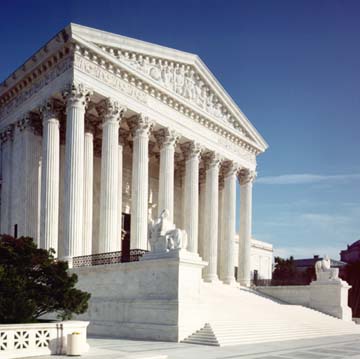Here are some poll numbers released by Rasmussen Reports -- "an electronic publishing firm specializing in the collection, publication, and distribution of public opinion polling information."

45% Say Legal Skills Are Top Factor For Next Supreme Court Nominee
Tuesday, May 12, 2009
 Forty-five percent (45%) of U.S. voters say the most important consideration in the selection of a U.S. Supreme
Forty-five percent (45%) of U.S. voters say the most important consideration in the selection of a U.S. Supreme ![]()
For 27% of voters, making sure the Supreme ![]()
Nearly as many (23%) believe the nominee's views on important issues should be the priority.
Most Republicans (56%) and voters not affiliated with either major party (50%) stress legal skills as the most important factor in the choosing of a high court nominee. Among Democrats, however, just 34% agree. A plurality of Democrats (37%) say it is most important to make sure the court represents the nation's diversity, while 23% say a nominee's views are paramount.
Justice David Souter has announced he is retiring, giving President ![]()
Forty-two percent (42%) of voters believe the president's nominee will be too liberal , while 41% say his choice will be about right. Only five percent (5%) think his nominee will be to conservative.
Voters are fairly closely divided over the political makeup of the current high court. Thirty-three percent (33%) say the court is too liberal, while 23% believe it's too conservative. Thirty-seven percent (37%) say the political balance is about right.
A majority of Republicans believe the court is too liberal, while Democrats are closely divided over whether it's too conservative or about right. Fifty-five percent (55%) of conservatives say the court is too liberal, while the identical percentage of liberals (55%) believe it's too conservative.
Generally speaking, conservatives argue for justices who are strict interpreters of the Constitution as written, while liberals have leaned more toward nominees who consider factors other than the letter of the law in their decisions. This division has prompted historically heated debates in the Senate, most notably over the first President Bush's unsuccessful selection of Judge Robert Bork to sit on the court. In some cases, this maneuvering has been aimed at keeping a nominee from even getting past the Senate Judiciary Committee.
But 46% of voters believe every presidential nominee for the Supreme Court should receive an up or down vote on the floor of the Senate. Eighteen percent (18%) disagree, and 36% aren't sure.
Fifty-six percent (56%) of Republicans support a mandatory vote in the Senate, compared to 39% of Democrats and 44% of unaffiliated voters.
Most voters consistently say the court should look more to the Constitution for its rulings rather than basing them on fairness and justice, although pluralities routinely say ![]()
Perhaps not surprisingly given the country's current economic problems, most voters rate the economy (57%) more important than national security (23%) and the type of Supreme Court justices he appoints (13%) when evaluating a president's performance.
Just after the election last November, 52% of voters said the type of Supreme Court justices a presidential candidate would nominate was Very Important in determining in how they cast their ballots.
Thirty-eight percent (38%) of voters say the Supreme Court is doing a good or excellent job . Sixteen percent (16%) feel its work is poor. These numbers have changed very little over the past two-and-a-half years.
# # #
 To view a copy of the original report, please use this link: Who Needs Law School?
To view a copy of the original report, please use this link: Who Needs Law School?
